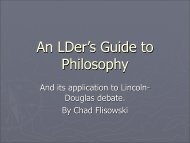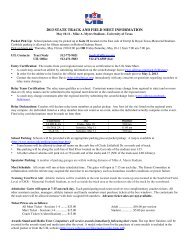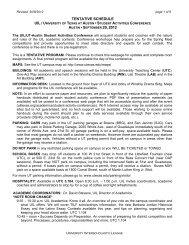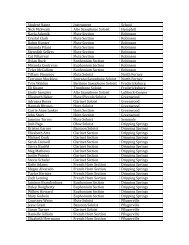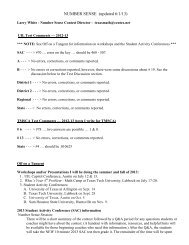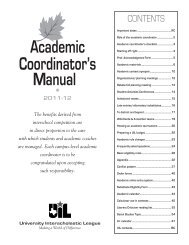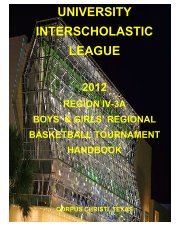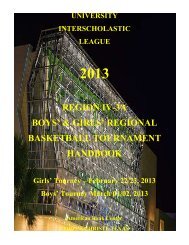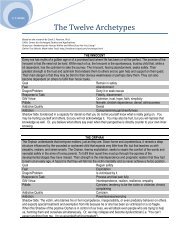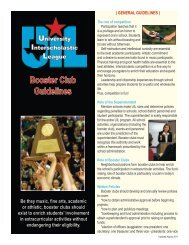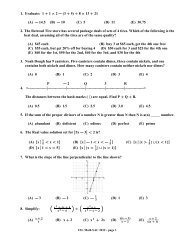vINTEF^CHOLASTIC LEAGUER, - University Interscholastic League
vINTEF^CHOLASTIC LEAGUER, - University Interscholastic League
vINTEF^CHOLASTIC LEAGUER, - University Interscholastic League
You also want an ePaper? Increase the reach of your titles
YUMPU automatically turns print PDFs into web optimized ePapers that Google loves.
Junior high schools have quite<br />
a problem in finding one-act plays<br />
suitable to the age-level and the<br />
audience appreciation capacity of<br />
their students. In talking with a<br />
number of junior high school dra<br />
matics directors, we have found<br />
that their biggest problem is to<br />
find plays which are just beyond<br />
the fairy story type (junior high<br />
students are at the age where they<br />
think they are too big—and too<br />
sophisticated—for the fantasies<br />
and the fairy stories) and just be<br />
low the really mature, penetrating<br />
plays that call for a sustained psy<br />
chological atmosphere.<br />
It is our belief that many of<br />
the fantasy plays, such as Three<br />
PilU in a Bottle, Six Who Pass<br />
While the Lentils Boil, Wonder<br />
Hat, and the like are excellent<br />
vehicles for junior high schools,<br />
but the students must be educated<br />
to appreciate such plays for their<br />
intrinsic worth, or the director<br />
will find that the students will<br />
have no part of them. Many<br />
junior high directors are faced<br />
with the problem of casting a<br />
great number of students in their<br />
plays. In the list below, several<br />
of the plays have been included<br />
because they have many characters<br />
and are in the junior high scope.<br />
We should like to express appreciation<br />
to Margaret Breedlove,<br />
dramatics director at the <strong>University</strong><br />
Junior High School, Austin,<br />
for suggesting many of these<br />
plays. She has tried most of them<br />
in her school and has found the<br />
plays on this list admirably suited<br />
to junior high school needs. Here,<br />
then, is a list of plays, with short<br />
reviews, especially chosen for<br />
junior high schools.<br />
The Pot Boiler by Alice Gerstenb<br />
e r g. 5 m 2 w, Longmans<br />
Green Co., Roy. $10 and $5,<br />
farce, 1 act. In the volume<br />
Ten One-art Plays by Alice<br />
Gerstenberg, $2.50.<br />
An excellent satire on the writing<br />
and directing of plays. Wellwritten<br />
and interesting to stage.<br />
The play is standard reading in<br />
many of the literature books now<br />
being used in the public schools<br />
and can be found in a number of<br />
anthologies.<br />
Goodnight, Please by James Daggett.<br />
4m3w, French, Roy. $5,<br />
comedy, 1 act.<br />
A banker who has had to work<br />
hard all his life decides to stay<br />
in bed for a week. His family<br />
is upset, but he sticks to his resolution<br />
and in so doing causes all<br />
sorts of interesting complications.<br />
This is a play with much action<br />
and excellent comedy situations.<br />
The Dyspeptic Ogre by Perciv&l<br />
Wilde. 2mlw and 14 or more<br />
extras, Baker, Roy. $10,<br />
comedy, 1 act, 40c.<br />
The Ogre thinks he has indigestion<br />
from eating too many little<br />
girls, but when the Boy Scouts<br />
come to rescue the remaining girls<br />
he has in his larder, the Irish Cook<br />
reveals she has been feeding the<br />
Ogre Irish Stew all the time. Moral<br />
of the piece is "Who believes in<br />
Ogres anyway?" An interesting<br />
take-oft 5 on fairy stories for youngsters<br />
of junior high age.<br />
Last Flight Over by Allean Lemmon.<br />
3m2w, Row Peterson,<br />
Roy. $5, serious play, 1 act,<br />
50c.<br />
A boy, embittered by his<br />
mother's untimely death, resolves<br />
to leave the hard pioneer life<br />
which killed her. But before he<br />
goes, he catches a vision from his<br />
father of what real pioneering<br />
means. This is a mature and sober<br />
play, demanding a good deal of<br />
skill on the part of the actors, but<br />
the play is well within the realm<br />
of junior high school students. Two<br />
of the characters are 'teen-agers<br />
and have excellent parts. The main<br />
mature role calls for a strong<br />
father.<br />
Oead End by Sidney Kingsley.<br />
22m6w, Dramatists Play Service,<br />
Roy. $35 (roy. for one<br />
act on application), serious<br />
play, 3 act, 85c.<br />
Act III is suited to junior high<br />
school groups, though the more<br />
mature characters are somewhat<br />
difficult for that age level to<br />
handle. Of course, characters must<br />
be cut to 10 for contest use, but<br />
students may double in several<br />
roles. This play of street urchins,<br />
of gangsters and police, of slums<br />
in the shadows of wealthy apartment<br />
buildings was an enormous<br />
success on Broadway, and spilled<br />
over into the movies to start a<br />
group of Dead End Kids pictures.<br />
Junior high school boys will enjoy<br />
working in the young hoodlum<br />
roles, and at the same time will be<br />
impressed with the searing lesson<br />
of the effect of environment on<br />
growing children.<br />
6w, French, Roy. $10 and $5,<br />
comedy, 1 act, 50c.<br />
An interesting story about a<br />
homeless child who is taken in by<br />
'the neighbors' in a small town.<br />
Zona Gale has written some excellent<br />
local color characters into<br />
this short play about life in a village<br />
which offers excellent acting<br />
opportunities to the whole cast.<br />
The Bathroom Door by Gertrude<br />
Jennings. 3m3w, French, Roy.<br />
$5, comedy, 1 act, 40c.<br />
Several people on the same floor<br />
of a hotel try to get into the bathroom,<br />
but the door seems to be<br />
locked. Finally, a servant comes<br />
and reveals that the door is merely<br />
stuck and the bathroom has been<br />
empty all the time. But the interval<br />
provides a number of interesting<br />
complications.<br />
Tom Sawyer's Morning, dramatized<br />
from the Mark Twain<br />
story by Regina Brown. 8m<br />
3w, Roy. $5, comedy, 1 act,<br />
40c.<br />
This is the account of how Tom<br />
gets the fence whitewashed by<br />
using psychology on his friends.<br />
In addition to the separate copies<br />
of the play, it is also included in<br />
the volume Twenty Short Plays on<br />
a Royalty Holiday, Vol. Ill, published<br />
by Samuel French.<br />
Little Women, dramatized from<br />
the Louisa M. Alcott story by<br />
John Ravold. 4m6w, French,<br />
Roy. $10, roy. for one act on<br />
application to publisher,<br />
comedy, 3 act, 75c.<br />
This is perhaps the best adaptation<br />
of the many available for<br />
junior high school use. The first<br />
act, particularly, is well suited to<br />
junior high age level. The characters<br />
of the girls who lived, loved,<br />
and sacrificed for each other are<br />
faithfully translated from the<br />
book to the play. Victorian costumes<br />
are called for.<br />
Our Hearts Were Young and Gay,<br />
dramatized from the Skinner-<br />
Kimbaugh story by Jean<br />
Kerr. 8m9w, Dramatic Publishing<br />
Co., Roy. $25, roy, for<br />
one act on application,<br />
comedy, 3 act. 85c.<br />
Act I of this delightful comedy<br />
makes a good vehicle for junior<br />
high schools. The story of the two<br />
girls who sail for Europe offers<br />
some good acting roles for the<br />
girls and some excellent character<br />
parts for the people who surround<br />
them. Costumes of the early<br />
1900's are called for.<br />
Sugar and Spice by Ryerson and<br />
Clements. 2m3w, French,<br />
Roy. $5, comedy, 1 act, 40c.<br />
The acquired mannerisms of a<br />
friend who has just returned from<br />
Paris influence the life of a 'teenage<br />
girl. She learns the hard way<br />
that more boys are caught with<br />
sugar than with vinegar. This is<br />
one of the better written 'teen-age<br />
shows and the characters are at<br />
least believable. Junior high<br />
schools will find that this is an excellent<br />
play to produce, for it<br />
combines good writing with ex<br />
periences in the realm of the<br />
students.<br />
Bill of Fare by Beatrice H. Mc<br />
Neil. Ilm6w, Baker, Roy. $5,<br />
comedy, 1 act, 40c.<br />
The students at the "Academy"<br />
have the charge-it habit and have<br />
almost put good-natured Uncle Joe<br />
out of business. (He runs an eating<br />
emporium.) But an auction<br />
sale saves Uncle Joe from financial<br />
ruin, and everybody is happy. A<br />
very good play in which a great<br />
many people can be used.<br />
The House of Juke by Valentine<br />
Davies. 3m2w, French, Roy.<br />
$5, comedy, 1 act, 40c.<br />
The Juke family has a strange<br />
sort of family pride. It has a great<br />
tradition for laziness, shiftlessness,<br />
and general disrepute. The father<br />
of the clan tries to maintain the<br />
tradition at all costs by getting rid<br />
of the one decent person who invades<br />
their privacy.<br />
The Importance of Being Earnest<br />
by Oscar Wilde, adapted by<br />
Melvin R. White. 3m4w,<br />
Northwestern Press, Roy. on<br />
application, comedy, 1 act (2<br />
scenes), 75c.<br />
This copy of the play is written<br />
especially for radio broadcasting,<br />
but it can easily be adapted to the<br />
stage. The play is included in the<br />
Northwestern Press collection<br />
called Radio and Assembly Plays,<br />
and is also included in the state<br />
adopted textbook Your Speech and<br />
Mine, by Watkins and Frost. The<br />
story is simply portrayed and the<br />
glib slickness of Wilde is preserved.<br />
The play about the two<br />
men who change their names to<br />
Earnest in order to marry the girls<br />
they love usually delights audiences.<br />
Since the language in this<br />
version has been somewhat simpli-<br />
fled, it is especially suitable for<br />
The Neighbors by Zona Gale. 2m i junior high school work.<br />
<strong>League</strong>'s Director<br />
Lists Sites, Heads<br />
Of Regional Meets<br />
(Continued from p. 1)<br />
Site: Stephen F. Austin State<br />
College, Nacogdoches.<br />
Director General: Lawrence<br />
Franks, SFASC.<br />
Conference AA: Districts 11<br />
and 12.<br />
REGION V<br />
Site: Sam Houston State College,<br />
Huntsville.<br />
Director General: Albert Kidd,<br />
SHSC.<br />
Conference A: Districts 22-26,<br />
inclusive.<br />
Conference B: Districts 57-67,<br />
inclusive.<br />
Site: <strong>University</strong> of Houston,<br />
Houston.<br />
Director General: Dr. W. W.<br />
Kemmerer, President, U. of H.<br />
Conference AA: Districts 13-<br />
15, inclusive.<br />
REGION VI<br />
Site: Southwest Texas State<br />
College, San Marcos.<br />
Director General: Dr. Pat H.<br />
Norwood, STSC.<br />
Conference AA: Districts 16<br />
and 17.<br />
Conference A: Districts 27-31,<br />
inclusive.<br />
Conference B: Districts 68-78,<br />
inclusive.<br />
REGION VII<br />
Site: A&I College, Kingsville.<br />
Director General: Dr. Eldon D.<br />
Brinley, A&I.<br />
Conference AA: District 18<br />
and 19.<br />
Conference A: Districts 32-34,<br />
inclusive.<br />
Conference B: Districts 79-86,<br />
inclusive.<br />
REGION VIII<br />
Site: Odessa High School.<br />
Director General: W. A. Miller,<br />
Superintendent of Schools, Odessa.<br />
Conference B: Districts 87-92,<br />
inclusive.<br />
Site: El Paso.<br />
Director General: J. M. Hanks,<br />
Superintendent of Schools, Ysleta.<br />
Conference AA: District 20.<br />
lNTERSCHOD'A'STTCCSK'eUER Page 3<br />
CUERO HIGH SCHOOL—Girls' Chorus was<br />
first division winner last spring. Under Mrs.<br />
Sarah Jo Buenning's direction, this group is a<br />
consistent winner.<br />
Cuero Students Carry Home Honors<br />
In Music, Speech and Tennis Contests<br />
Cuero High School's record in<br />
<strong>Interscholastic</strong> <strong>League</strong> competition<br />
is a good one. The school, under<br />
the leadership of Superintendent<br />
E. B. Morrison, participates in all<br />
MRS. ANITA MORRI?<br />
Speech In Texas Schools<br />
HIS column belongs to Texas Speech<br />
T teachers for discussion o! speech<br />
problems and news concerning Speech<br />
activities in Texas high schools. Com-<br />
The Mid-Century Conference of<br />
the Speech Association of America,<br />
American Educational Theatre;<br />
Association, Debate Committee of<br />
the National <strong>University</strong> Extension<br />
Association, and the National<br />
Thespian Society was held December<br />
26-31 in the Commodore and<br />
Roosevelt Hotels in New "York<br />
City.<br />
A great delegation from Texas<br />
was in evidence at every meeting<br />
of the convention. Among those<br />
reporting in from Texas were<br />
Wilhelmina Hedde of Dallas; Ted<br />
Skinner of A. & I. College, Kingsville;<br />
Tom Rousse, Lucy Barton,<br />
Loren Winship, Bruce Roach,<br />
Jesse Villarreal, Bob Norris and<br />
Ernest Hardin from The <strong>University</strong><br />
of Texas; Fred Barton of<br />
Abilene Christian College; Glenn<br />
Capp and Chloe Armstrong from<br />
Baylor <strong>University</strong>; P. Mervill Larson<br />
of Texas Tech, Lubbock; Otis<br />
Walter, and W. W. Cook, <strong>University</strong><br />
of Houston; Barney McGrath<br />
from Southern Methodist <strong>University</strong>,<br />
Dallas; Southwest Texas<br />
State College sent some seven<br />
students along with the speech<br />
staff. Other colleges had many<br />
student representatives also.<br />
Many former Texans were in<br />
evidence. Some of those we saw<br />
were Sara Lowrey, McDonald<br />
Held, Arthur Angrist, Edd Miller,<br />
Yetta Mitchell, J. Clark Weaver,<br />
Helene Blattner, and Hugh Seabury.<br />
A number of the Texas representatives<br />
had parts on the program.<br />
P. Merville Larson spoke<br />
on "Some Directions for the Forensics<br />
Program" in the High<br />
School Forensics section. Fred<br />
Barton spoke on "Extemporaneous<br />
Preaching in American Homiletic<br />
Theory: An Historical Survey" in<br />
the Preaching Theory and Practice<br />
section. Wilhelmine Hedde talked<br />
on "Speech Progress in the South"<br />
in the Speech in Junior High<br />
School section. Tom Rousse teamed<br />
up with Arthur Secord on the affirmative<br />
against Norman Thomas<br />
and Harry W. Laidler to debate<br />
the Welfare State question at one<br />
of the evening general sessions.<br />
Edd Miller spoke on "Speaking<br />
Rate in Group Discussion" at the<br />
section on Experimental Studies<br />
in Public Address. Glenn Capp<br />
was program chairman and took<br />
part in the panel discussion on<br />
the topic "What Standards Should<br />
Govern Intercollegiate Discussion<br />
and Debate?" At the Speech Reeducation<br />
session, Jesse Villarreal<br />
spoke on "Speech Re-education for<br />
the Mentally Retarded." Bruce<br />
Roach was in charge of the AETA<br />
desk and served on the Executive<br />
Committee of the NUEA Debate<br />
section for the choice of the national<br />
debate topic. Loren Winship<br />
was commentator on the paper<br />
munications should be sent to Mr. Bruce<br />
Roach. Box H, <strong>University</strong> Station,<br />
Austin, Texas, who is editor of this<br />
column.<br />
"Report on the Current Graduate<br />
Programs in Drama." Ted Skinner<br />
was chairman of the section on<br />
Radio and Television. J. Clark<br />
Weaver spoke on "Radio and the<br />
Quality of Living."<br />
In addition to the convention<br />
sessions, Texans were busy seeing<br />
New York, attending shows and<br />
broadcasts, and making special<br />
luncheons and dinners. We had<br />
the privilege of seeing "Country<br />
Girl," "The Lady is Not for Burning,"<br />
"Season in the Sun," "Ring<br />
Around the Moon," and "Gentlemen<br />
Prefer Blondes." We were<br />
most impressed by the new Clifford<br />
Odets play, "Country Girl." If we<br />
may editorialize, this play about<br />
an alcoholic actor who makes a<br />
comeback is probably the finest<br />
thing Odets has done in a long<br />
time.<br />
When the conventioners arrived<br />
in New York, snow was falling<br />
thick and furiously, but before<br />
the week was out, most of the<br />
snow had melted and the last two<br />
days of the convention enjoyed<br />
comparatively nice weather.<br />
Texans not used to the cold had<br />
a good time getting together and<br />
cursing the Yankee weather.<br />
In all, some 3000 registered for<br />
the convention. This is one of<br />
the largest gatherings ever recorded<br />
by the Speech Association.<br />
Members To Vote<br />
On Four Proposed<br />
Rules This Spring<br />
(Continued from Page 1)<br />
ing on this question, the schools<br />
will no longer vote by confer<br />
ences The vote will determine<br />
the state-wide rule on spring<br />
football training. The Advisory<br />
Council recommended that the<br />
State Executive Committee<br />
eliminate the privilege of settl<br />
ing this question by conferences.<br />
Until the ballot is submitted in<br />
April, the pages of the <strong>League</strong>r<br />
are open for discussion on the<br />
pros and cons of these questions.<br />
Schoolmen wishing to present<br />
arguments for and against the<br />
various rules should submit their<br />
copy at once, since there will be<br />
only two publications of the<br />
<strong>League</strong>r, the February and March<br />
issues, for a public discussion of<br />
the issues. If you are for or<br />
against any of these proposed<br />
rules, please set forth your reasons<br />
and let us have them, and we shall<br />
publicize them in the <strong>League</strong>r.<br />
Member schools are urged to<br />
use the pages of the <strong>League</strong>r in<br />
discussing the merits and demerits<br />
of the various proposals.<br />
phases of <strong>League</strong> athletic activity<br />
except golf, and in most of the<br />
academic contests. It has shown<br />
outstanding results in a number<br />
of these fields.<br />
In music and speech the South<br />
Central Texas school has been particularly<br />
successful, winning high<br />
ratings year after year.<br />
Last year, for example, the<br />
Cuero band, under the direction<br />
of George W. Bodenmiller, won<br />
a first place in the San Antonio<br />
fall marching contest, and<br />
placed in the playing contest<br />
during the spring festival. The<br />
high school girls' chorus, under<br />
the leadership of Mrs. Sarah<br />
Jo Buenning, won first division<br />
in the spring festival, and the<br />
Cuero elementary girls' chorus,<br />
also led by Mrs. Buenning, took<br />
another first division ranking.<br />
In speech, the District 24 school<br />
has won numerous high honors.<br />
Two consecutive Class A State<br />
Championships in the One Act<br />
Play Contest have been taken<br />
home by the Cuero students. Both<br />
championship entries have been<br />
directed by Mrs. Orita Morrison,<br />
and from both title-winning casts<br />
came several members of all-star<br />
casts. Also, in 1950 Mrs. Mor-<br />
, (as far as this<br />
contest is carried)<br />
; her senior<br />
girl declaimer<br />
won second<br />
place in the region<br />
; and her<br />
senior boy declaimer,<br />
Bobby<br />
Newman, won<br />
first place in<br />
SAGER<br />
regional competition<br />
and<br />
was second in<br />
the State Meet.<br />
He was also a<br />
member of the<br />
champions hip<br />
one act play<br />
cast in 1950,<br />
playing the part<br />
of August Behrend<br />
in "The<br />
BREITKREUTZ Enemy."<br />
rend in "The Enemy."<br />
In addition to these achievements<br />
in the speech and dramatics<br />
field, the Cuero school can point<br />
to the fact that the one act play<br />
winners produced the best actress<br />
and best actor in Conference A in<br />
both 1«49 and 1950. All four<br />
performers were in their first year<br />
of competition when they won the<br />
highest honors. In the 1949 State<br />
Meet, Gwendolyn Boehl and Dan<br />
Cage, playing the parts of Ma<br />
and Pa Fischer in "The Undercurrent,"<br />
won best acting honors.<br />
In 1950, Lillian Hanson, playing<br />
the part of Pauli Behrend, and<br />
Vernon Breitkreutz, playing the<br />
part of Dr. Arndt, won acting<br />
honors in "The Enemy." All of<br />
these except Vernon were seniors<br />
during the first year of competition.<br />
He, however, was a junior<br />
and is taking part in the Cuero<br />
dramatic work again this year.<br />
These four, of course, were also<br />
selected for the All-Star Casts in<br />
1949 and 1950. In addition, Joline<br />
Sager, who played the part<br />
of Baruska in "The Enemy," was<br />
selected for the All-Star Cast of<br />
1950. She was a member of the<br />
winning girls' chorus, and was an<br />
honor student.<br />
The list of Cuero triumphs<br />
in <strong>League</strong> work does not stop<br />
with speech and music. The<br />
school made creditable showings<br />
in all sports last year, but the<br />
most outstanding accomplishment<br />
was that of the baseball<br />
team, District 24-A champions.<br />
Under the coaching of Charlie<br />
Munson, former <strong>University</strong> of<br />
Texas star, and behind the<br />
pitching of Gus Mason, the<br />
Gobblers defeated New Braunfels<br />
8-0 and 6-2 for the district<br />
crown.<br />
In tennis, Cuero racked up a<br />
second place in the state. Joyce<br />
Towery, daughter of Mr. and Mrs.<br />
W. R. Towery. went to the finals<br />
in Class A Senior Girls' Tennis<br />
even though she was but a freshman<br />
in 1950. The young star,<br />
class favorite in her first year<br />
in high school, is also a member<br />
of the crack Gobblej* Band and<br />
takes an active part in student<br />
affairs.<br />
Cuero was also represented in<br />
the state contest in shorthand in<br />
the 1950 State Meet. Donna Fay<br />
Barfleld was the contestant. In<br />
1949 she was the school representative<br />
in the State Meet Typing<br />
Contest. She was coached by Mrs.<br />
Morrison, whose major work has<br />
been in commercial work, and<br />
whose minor is in speech and dramatics.<br />
Donna Fay, daughter of<br />
Mr. and Mrs. Willis Barfield, was<br />
also a member of the first division<br />
girls' chorus, and was editor-inchief<br />
of the 1950 school annual.<br />
LILLIAN HANSON<br />
<strong>League</strong> Basketball<br />
Playoff Schedules<br />
Begin This Month<br />
(Continued from p. 1)<br />
han, regional chairman.<br />
Region VII—Districts 84-92,<br />
Texas College of Arts and Industries;<br />
Jess Mundy, regional chairman.<br />
Region VIII—Districts 93-96,<br />
Sul Ross State Teachers College,<br />
Alpine; Dr. Richard Hawkins, regional<br />
chairman.<br />
CONFERENCE A<br />
A regional chairman has been<br />
named for each of the eight regions<br />
in Conference A, who will<br />
confer with the district chairman<br />
of his region to determine the<br />
site for the regional tournament.<br />
These eight chairmen are:<br />
Region I—Districts 1-4; Superintendent<br />
W. C. Davis, Memphis.<br />
Region II—Districts 5-8; Principal<br />
Joe A. Forester, Ballinger.<br />
Region III—Districts 9-12;<br />
Principal L. T. Scarborough,<br />
Handley.<br />
Region IV—Districts 13-16; Superintendent<br />
M. F. Fleming, Mt.<br />
Vernon.<br />
Region V—Districts 17-20; Superintendent<br />
Allen Kavanaugh,<br />
New London.<br />
Region VI—Districts 21-24; Superintendent<br />
J. L. Buckley, Lockhart.<br />
Region VII—Districts 25-28;<br />
Superintendent F. C. Herndon,<br />
Lamar (Rosenberg).<br />
Region VIII—Districts 29-32;<br />
Superintendent E. M. Smith, Sinton.<br />
"It is necessary," says Dr. Rhea<br />
H. Williams, "that the names of<br />
the district champions and the regional<br />
champions be sent immediately<br />
to the State Office. Arrangements<br />
for the regional tournaments<br />
and the State Tournament<br />
cannot be completed until the<br />
name of each qualifying school is<br />
submitted.<br />
New Safety Education<br />
Bulletin Being Readied<br />
The Work Conference in Safety<br />
Education at The <strong>University</strong> of<br />
Texas is preparing a new bulletin<br />
for school administrators, which<br />
will answer questions concerning<br />
safety education, Dr. D. K. Brace,<br />
conference director, said.<br />
The Texas Safety Association<br />
is financing the conference.<br />
BROADCAST<br />
Elsewhere in this issue you will<br />
find the announcement of the<br />
forthcoming annual music broadcast<br />
over the Texas State Network.<br />
Three top music organizations<br />
in Texas are participating in<br />
this event this year.<br />
Whether or not you realize<br />
it, the fact that we have been<br />
forced to combine three groups<br />
in order to justify the music<br />
broadcast is a condemnation of<br />
the attitude of music teachers<br />
throughout the state.<br />
As we have stated before, the<br />
Texas State Network has gone to<br />
extreme limits to co-operate with<br />
us in this public service. Various<br />
local stations affiliated with the<br />
Network have cancelled commercial<br />
programs in order to cooperate.<br />
All they asked in return<br />
was a report that a vast number<br />
of students and teachers were<br />
listening. That we have not been<br />
able to furnish. The highest number<br />
ever reported was a very<br />
lenient 7,000. When this number<br />
is compared to about 80,000 students<br />
taking part in the spring<br />
competition-festivals, it is hard to<br />
justify this educational radio<br />
broadcast.<br />
We had hoped that we might<br />
sponsor three separate broadcasts<br />
each year, one featuring a band,<br />
one an orchestra and at least one<br />
for a choral group. This might<br />
have been possible had we been<br />
able to report 50,000 listeners.<br />
Instead, it is logical that we have<br />
been asked to combine all three<br />
organizations in one broadcast—<br />
about eight minutes each. If you<br />
like to hear what organizations<br />
are doing across the state, be<br />
prepared to drop the state office<br />
a card and report the total number<br />
of listeners in your group.<br />
In addition to this, it wouldn't<br />
be a bad idea to write a letter to<br />
Mr. Charles Jordan, Vice-President<br />
of the Texas State Network<br />
at Station KFJZ in Fort Worth,<br />
and also write the manager of<br />
the station to which you listen. As<br />
you well know, the life of a radio<br />
station is bound up in its statistics.<br />
SUGGESTED RULES<br />
It seems that some bands in<br />
some of the Regions have been<br />
buying the gold medals suggested<br />
for Division I Winners in<br />
solo and ensemble contests for<br />
each member of their band when<br />
they won a Division I in marching.<br />
This appears a mite expensive for<br />
one thing and a little inequitable<br />
for another. Estill Foster, Band<br />
Director at Bishop, when interrogated<br />
on the subject had this to<br />
say, "It is my understanding that<br />
these medals should be worn by<br />
students who have won them in<br />
solo and ensemble competition<br />
only. If the medals are to mean<br />
what they should, I feel that they<br />
should be available only through<br />
your office and upon requisition<br />
by the proper authorities."<br />
Foster further suggests that we<br />
re-state the rule to specifically exclude<br />
this use of the medals and<br />
By F. W. SAVAGE<br />
Director of Music Activities<br />
also brings up another problem<br />
which seems to have merit. He<br />
states, "Our twirling judge had<br />
many students entered in Class II<br />
competition who had made a first<br />
division in the same class the<br />
previous year. This forced the<br />
jujjge to give too many first divi<br />
sion ratings or penalize students<br />
who actually belonged in Class II<br />
competition. Couldn't we have a<br />
ruling to the effect that students<br />
who have previously been awarded<br />
a first division rating in Class II<br />
or III be forced to move to a<br />
higher classification? I think this<br />
would be fair to the more in<br />
experienced performers."<br />
We agree with Mr. Foster on<br />
both contentions. What is your<br />
opinion? Incidentally we have not<br />
received a single opinion concerning<br />
the proposed classification<br />
change which was stated in last<br />
month's issue of the <strong>League</strong>r. The<br />
best way for you to exercise your<br />
rights in making rule changes is<br />
to write this office a letter now<br />
and then. Although we don't have<br />
the last word in making rule<br />
changes, we can refer them to the<br />
proper authorities.<br />
The answers in this column are in no<br />
sense "official interpretations." Only the<br />
State Executive Committee is competent<br />
under the rules to make official interpretations,<br />
and the State Committee's interpretations<br />
appear in the Official Notice column<br />
of THE <strong>LEAGUER</strong>. These are answers to<br />
inquiries which are made in the course of<br />
Q. Does participation by a B<br />
squad in a basketball tournament<br />
count as one of the three a team<br />
is allowed to enter?<br />
A. This interpretation involves<br />
Rule 11 of the Basketball Plan and<br />
the new Team Rule definition,<br />
Article VII, Section 23. Schools<br />
may maintain an A squad which<br />
is competing for <strong>League</strong> honors,<br />
and a B squad which is not corn-<br />
definite and distinct from each<br />
other, and if a boy plays in three<br />
tournaments but they must be kept<br />
definite an ddistinct from each<br />
other, and if a bay plays in three<br />
tournaments on the B squad and<br />
is then transferred to the A squad,<br />
if the A squad has played in one<br />
tournament the A squad has then<br />
violated the tournament rule. The<br />
important thing to keep in mind is<br />
this: any person who plays on the<br />
A team at any time who has com<br />
pleted in more than three tourna<br />
ments, regardless of which team he<br />
competed on, will cause the A team<br />
to violate the tournament rule.<br />
MUSICIAN OF A SORT<br />
A dog can detect the difference<br />
between notes only one-eighth of<br />
a tone apart, according to the Encyclopedia<br />
Britannica.<br />
HIGH SCHOOL PRESS<br />
Some of the City Conference<br />
members of ILPC have been asking<br />
questions concerning plans for the<br />
journalism contest at the State<br />
Meet. The questions came as the<br />
result of the statement in last<br />
month's <strong>League</strong>r that the State<br />
Meet this spring would probably<br />
find all conferences back in Austin.<br />
The questions are certainly ap<br />
propriate right now, for it is almost<br />
time to begin planning for the<br />
journalism contests and for the<br />
convention which ILPC holds at<br />
the time of the contest.<br />
The answer is simple: there<br />
will be no separate City Conference<br />
State Meet this spring.<br />
As far as the State Meet events<br />
are concerned, the City Conference<br />
has ceased to exist, as<br />
of the announcements contained<br />
elsewhere in this <strong>League</strong>r. For<br />
Spring Meet purposes, the<br />
schools of the City Conference<br />
are once more in Conference<br />
AA. (Remember that the new<br />
4-A and 3-A classifications are<br />
purely for football and basketball<br />
competition; the AA for<br />
Spring Meet is exactly as it has<br />
always been.)<br />
Now all journalism contestants<br />
will compete in a regional meet.<br />
(There is no district contest in<br />
journalism.) The City Conference<br />
schools' journalists will no longer<br />
go direct to the State Meet, but<br />
will take part in the regional<br />
meet to which their school is assigned<br />
(See the Spring Meet list<br />
published in this paper).<br />
Each ILPC member paper, without<br />
exception, will this year be<br />
entitled to send two official contestants<br />
to the regional meet.<br />
The contestants scoring the two<br />
highest individual scores in the<br />
regional contest, in each conference,<br />
will represent the region at<br />
the State Meet. The State Meet<br />
for all contestants will be held in<br />
Austin, and no separate City Conference<br />
meet will be held in Fort<br />
Worth, as originally planned.<br />
For purposes of determining<br />
regional championships in journalism,<br />
the journalism contest director<br />
in each region is empowered<br />
to announce team scores. The<br />
paper whose pair of contestants<br />
scores the highest combined total<br />
will be the regional winner. But<br />
team scores have no bearing on<br />
who shall move on up to the State<br />
Meet. Only if the members of the<br />
high scoring team are individually<br />
highest will they both go to the<br />
State Meet; it is more likely that<br />
only one member of the championship<br />
regional team will be an<br />
official contestant to the finals and<br />
that the other high individual' will<br />
come from another team. It is entirely<br />
possible, in a closely contested<br />
meet, that the high individuals<br />
will neither one be a member<br />
of the high team.<br />
To take care of the absorption<br />
of City Conference in Conference<br />
AA, new regions have been<br />
added to the AA list. Now there<br />
will be 16 journalism contestants<br />
in A A at the State Meet,<br />
instead of 10 as last year. Conference<br />
A and B will remain at<br />
14 and 16 contestants respectively.<br />
Each ILPC member will receive<br />
information concerning the date<br />
and sites of regional contests,<br />
well in advance of the contest<br />
day. Instructions will be included.



